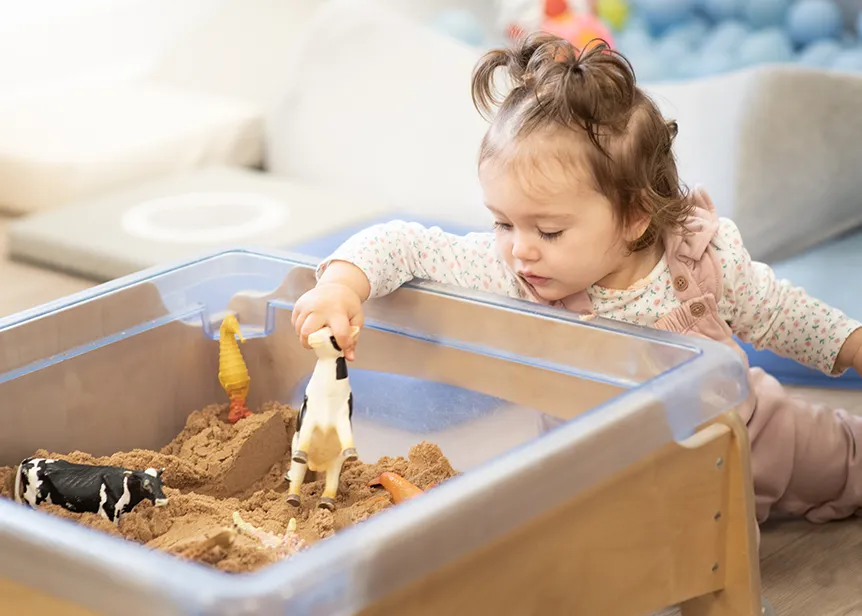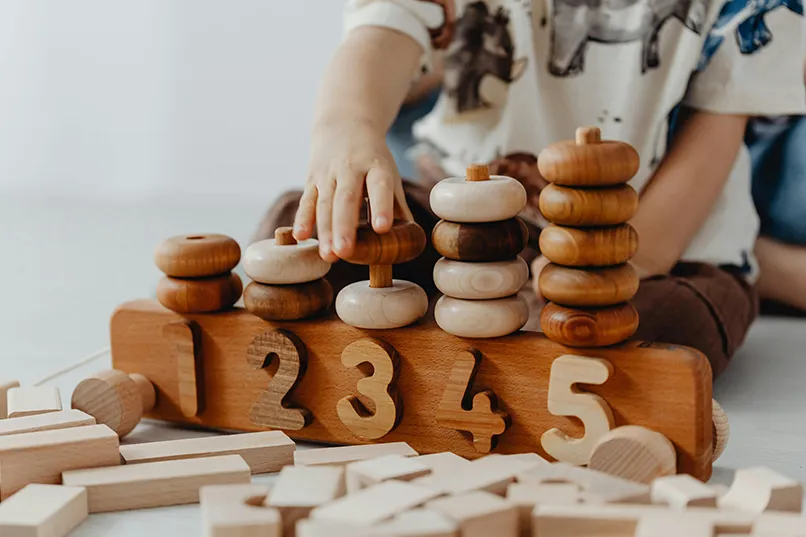About us
Understanding the Montessori Nursery Approach
Experience an innovative, child-led approach to education that nurtures independence, curiosity, and love for learning.
The Montessori nursery approach focuses on a hands-on, child-led way of learning, sparking curiosity and independence in each and every child so they are prepared for primary school and beyond.
This method is designed to support a child’s development by providing a nurturing environment that fosters individual growth and social skills through interaction with peers.

What is a Montessori Nursery?
The Montessori approach is more than just education, it’s a concept that recognises the unique potential of every child.
This education theory focuses on child-led learning, allowing children to explore their own interests through hands-on activities with specifically designed learning materials.
Montessori style classrooms allow children of all early years ages to play together, facilitating more collaborative play and more inclusive social dynamics.
This educational philosophy was originally created by Dr Maria Montessori, an educational psychologist who became inspired to create her own method of education after working with children who were developmentally delayed.
She became the co-director of a school to train teachers in educating SEND children in which she used her own, bespoke materials and methods to help children with their development.
She later amended her philosophy to suit all stages of learning, regardless of developmental ability. It is now a much-desired learning approach in nurseries across the world.

The Key Features of the Montessori Method
Child-Led Learning
Montessori learning is all about exploration and developing independence in each and every child.
This learning approach allows children, with the guidance of a Montessori teacher, to choose what items and activities they wish to play with, developing a deeper interest and understanding in certain subject areas, such as mathematics, language, social interaction and more.
When children invest their attention into areas that they show an interest in, it inspires creativity, independence and intrinsic motivation.
Unlike other educational approaches, Montessori learning doesn’t follow a set timetable, meaning that children have endless opportunities to engage with the activities of their choice, facilitating a deeper knowledge of areas that they are interested in.
Prepared Environment
Another aspect that sets this learning approach apart from others, is the carefully designed spaces which encourage independence and creativity.
Classrooms allow children to free flow around the room, or rooms, which have designated areas relating to a subject, such as sensory activities, science and literacy, which children can interact with if and when they wish to.
The belief is that environments set up like this foster a deeper understanding of learning and subject matters, and encourages movement around the room, and social interaction with different friends.
Even though children have the freedom to explore their nursery room as they wish, the environment still has a methodical structure and order to encourage children to move around the room and explore other interests at their own pace.
Hands-On Materials
Unlike other nursery settings, Montessori nurseries believe in a hands-on learning philosophy using specially crafted tools for experiential learning.
Children are encouraged to follow their natural instincts when interacting with objects, fostering a natural curiosity and allowing children to think more creatively in how they want to use items.
The Montessori philosophy believe in using materials and tools that are scaled to the child’s size and skill level.
These support all aspects of every child’s development, for example, using objects that can fit a child’s hand can help them develop fine motor skills more effectively and using objects that are made out of more natural materials like wood rather than plastic can provide more sensory stimulation.
Respect for Individual Pace
All children learn at different paces and the Montessori methodology embraces this, ensuring that no child is left behind.
Compared to other early years practices, the Montessori curriculum is not set around any nursery school age.
All children mix together from birth to three and from three to six, so every child can learn from other children regardless of their age or skill.
The belief behind this is that children naturally learn from older peers, which encourage younger children to develop their own independence at a pace they are ready for.
Teachers and the child’s key person encourage ages to work together, helping them prepare for mixing with older children and people with different skill sets at school and the wider world.
The Montessori Teaching Approach
A Montessori teacher has a vital part to play in every child’s development and requires specialist training to ensure they adopt the three key principles:

How Montessori Teaches Key Skills
The Montessori method brings a wide variety of benefits that supports children’s development for later on in life. Montessori nurseries also emphasise a child-centred approach that is also common in many traditional preschools.
Practical Life Skills
This educational practice helps develop practical life skills which children can take with them to other areas of life, such as cleaning up, dressing themselves and serving their own food and drinks.
In a Montessori setting, children are required to pack away the object they were playing with before choosing something else to play with.
These skills and disciplines not only help foster independence at a young age but also helps prepare children for primary school, where they will be required to pack away their items and dress themselves in their uniform.
Sensorial Development
The natural materials used in the Montessori nursery approach engages all the senses which helps children notice the differences in objects, helps them compare items and facilitates the foundations of decision making skills.
Activities that explore the weights of different items can help young children distinguish what items are heavier than others and then how best to use these items in other activities.
These skills lay the foundations for STEM theory and expands each and every child’s curiosity in every day items, encouraging them to ask questions about the world around them and to seek out the answer.
Language and Literacy
Reading corners in nursery rooms encourage children to take interest in books and look at words, creating the foundations for phonetic-based learning and sparking curiosity for reading and writing.
Children who choose to sit down with their key person to read a story could ignite a love for reading and writing, starting the journey to enable them to read on their own.
Phonetics and literacy is a key part of everyday life. It not only provides the foundations of reading and writing for school, but strengthens communication and language development in early years education.
Mathematics
Numbers are all around us! Using tangible items and materials like number rods and bead chains make abstract concepts more tangible to children.
Activities like counting beads on an abacus and separating into groups of ten can help nursery children understand place values, building the foundations for more complex maths problems at school.
Cultural and Science Studies
Subjects like art, geography, and biology inspire global awareness and creativity in young children.
Activities like playing in a garden surrounded by wildlife, looking at countries on a globe and looking at a famous painting in a book, spark curiosity and creativity in children which they can expand on in other activities.
Such as planting their own flower in pot, or experimenting with different colours of paint on paper.
Early exposure to these subjects is shown to encourage further exploration of these creative outlets in adults, whether that’s painting or traveling to explore other countries.
A quote from Dr. Maria Montessori:
“Never help a child with a task at which he feels he can succeed.”

The Montessori Classroom in Action
A day in the life of a Montessori nursery can vary from nursery to nursery, so it’s always worth visiting your desired nursery to get a real-feel of the daily activities they do.
We spoke to one our Montessori nurseries to get an example of what a usual day would look like for them:

The Benefits of Montessori Education
There are so many benefits of Montessori nursery education and here are just a few we think stand out:
- Fosters self-discipline and focus – As children choose which items they would like to play with, it can help develop children’s attention span in a more natural way and improve their self-discipline through their freedom of choice.
- Encourages critical thinking and problem-solving skills – The bespoke, open-ended materials and resources used in Montessori education allows children to use these items creatively, building the foundations for critical thinking and problem-solving.
- Builds social and emotional intelligence through collaborative activities – The free flow environment allows children to communicate with different children of different ages, building social and emotional intelligence from a younger age and allowing children to work together on activities that they have a common interest in.
- Prepares children for academic success and lifelong learning – The Montessori philosophy provides the foundations of strong physical, emotional, social and cogitative development, giving every child the building block to thrive in school and beyond!
Ready to Discover the Montessori Difference?
At Grandir UK, we are proud to have multiple Montessori nurseries and nurseries whose curriculums are inspired by elements of the Montessori philosophy.
Talk to us today about the Montessori methodology and our Montessori style nurseries near you, you can also book your private tour to see these nurseries in action!